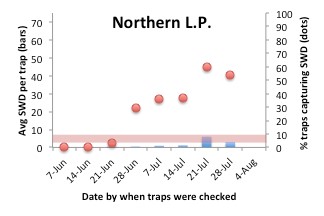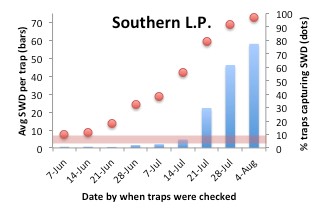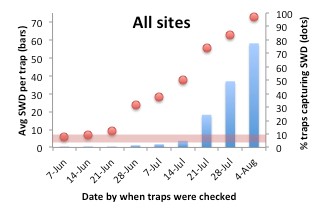Michigan spotted wing Drosophila report for Aug. 5, 2016
Trap catches continue to remain high, especially near untreated plantings. High risk of infestation continues to be expected; susceptible crops must be protected.
This is the Michigan State University Extension spotted wing Drosophila (SWD) Statewide Monitoring Network report. Trapping has concluded in most plantings where harvest is already complete including northwest cherry orchards, but trapping continues in most blueberry, grape, peach and raspberry sites in the network.
Out of the 97 traps collected during the week prior to Aug. 4, we captured a total of 2,474 female and 3,160 male SWD for a total of 5,634 SWD flies. We found SWD in 94 traps, or 97 percent of the traps being monitored, indicating SWD is active now in almost all locations around fruit farms.
The regions that are being monitored for SWD in 2016, how each region is defined (by the counties listed), the number of sites in each region that were monitored this week, the cumulative total of SWD flies caught in traps by region, and the average number of SWD flies caught per trap. | ||||
|---|---|---|---|---|
|
Region |
Counties covered in the SWD monitoring network |
# sites this week |
Cumulative SWD total |
Average SWD flies per trap* |
|
Southeast |
Genesee, Ingham, Lenawee, Livingston, Macomb, Monroe, Oakland |
16 |
2,298 |
65.5 |
|
Southwest |
Allegan, Berrien, Kalamazoo, Ottawa, Van Buren |
63 |
9,971 |
68.7 |
|
Ridge |
Ionia, Kent, Muskegon |
9 |
393 |
18.7 |
|
West central |
Mecosta, Oceana |
6 |
144 |
7.3 |
|
Northwest |
Antrim, Benzie, Grand Traverse, Leelanau, Manistee |
0 |
430 |
Trapping has concluded |
|
Grand total: |
97 |
13,236 |
58.1 |
|
* Average is for the week ending Aug. 4, 2016.
Average SWD catch in the traps being monitored this week is now more than 60 SWD flies per trap in the southern part of the Lower Peninsula, which is a third more than numbers trapped last week. Ripening fruit throughout the state are at high risk for infestation if not protected. Check with local MSU Extension staff or crop consultants, and refer to the “2016 Michigan Fruit Management Guide” for recommendations for your crops.



Bars represent the average number of SWD flies caught in monitoring network traps each week. Dots represent the percent traps that captured SWD that week. The shaded bar across each graph represents the proposed threshold for triggering management of the pest in susceptible crops. Northern L.P. encompasses all network traps in counties north of and including Clare in the Lower Peninsula (n = 0 traps this week). Southern L.P. encompasses all network traps in counties south of Clare in the Lower Peninsula (n = 97 traps this week).
Traps in the network are baited with commercially available lures and placed in susceptible crop fields or orchards, or in a location adjacent to susceptible crops, in areas where SWD infestation has been recorded in the past. Commercial plantings included strawberry, blueberry, raspberry, grape, tart and sweet cherry, peach and plum. Counties included in the 2016 trapping network are Allegan, Antrim, Benzie, Berrien, Genesee, Grand Traverse, Ingham, Ionia, Kalamazoo, Kent, Leelanau, Lenawee, Livingston, Macomb, Manistee, Mecosta, Monroe, Muskegon, Oakland, Oceana, Ottawa and Van Buren.
For the most current recommendations for monitoring this pest, please refer to “Monitoring traps for catching spotted wing Drosophila.” You can find out more about how to identify and manage this pest in fruit crops by visiting MSU’s Spotted Wing Drosophila website.



 Print
Print Email
Email

